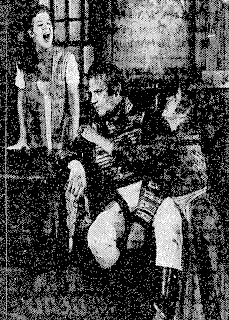At the beginning of 2020, I was very much looking forward to seeing the show on stage. Then COVID-19 changed everyone's plans. The world was placed in lockdown, and live theatre suddenly became illegal.
While most of New York City's wealthy and prestigious arts organizations went into mothballs, shutting down completely, and laying off all but their most privileged and highly paid employees, little Irish Rep decided to throw themselves into doing everything they could to keep theatre alive.
Virtual performance seemed the only option, but how do you stage A Touch of the Poet in little rectangles? It seemed impossible, but Irish Rep managed to stretch the medium, providing a virtual background, costumed performers, and innovative camera work to try to make it appear that actors were in the same room when in reality they might be on opposite sides of the country.
The results were mixed. Some moments, like when Con (played by Robert Cuccioli) stared into the mirror, were brilliant, while others labored under the difficulties of virtual performance. Still, it would be churlish to fault the artists, who in the midst of a disastrous pandemic were giving their all. It was great to see those same performers now able to act with their full bodies and to interact with one another viscerally in a way they couldn't in cyberspace.
Cuccioli, who was so devilishly good the previous fall in Mrs. Warren's Profession, perhaps had the least difficulty with the virtual performance, since in the play Con keeps himself so aloof from the other characters. Other performers were not quite so lucky. James Russell, who had an opportunity to shine in Irish Rep's production of The Shadow of a Gunman, got lost in those little rectangles, but he gives a memorable performance onstage as the barkeep Mickey Maloy.
As Con's daughter Sara, Belle Aykroyd had an even greater challenge trying to give a virtual performance, but now she is able to soar. Sara passionately throws her arms around her father in a way that simply was not possible when actors were being Zoomed onto a virtual stage.
I plan to write a full review of the production for The Eugene O'Neill Review, so I won't say much more about the show now (other than that you should go see it). However, I think it's worth reflecting on not just how this production took so long to get to the stage, but how the play itself had such a difficult journey from when O'Neill first finished writing it in 1942 to when it finally received its world premiere in 1958.
O'Neill had originally conceived of the work as a part of a massive cycle of plays telling the story of one family across American history. After completing the plays, though, O'Neill was unsatisfied with his work, and he destroyed all but two of them, A Touch of the Poet and its sequel More Stately Mansions. It was not until after he died in 1953 that anyone could even get a look at the unpublished masterpieces he had left behind him.
Among his plays left unpublished at his death was O'Neill's most famous work, Long Day's Journey into Night, which premiered in 1956. A Touch of the Poet was published the following year, and the New York Times wrote that in comparison to Journey it seemed "a temperate play." Well, that's only in comparison, since O'Neill's Poet is filled with emotional fireworks.
The world premiere of the play occurred at the Royal Dramatic Theatre in Sweden, and the piece subsequently opened on Broadway at the Helen Hayes Theatre with Eric Portman as Con and Hayes herself as Con's wife Nora. Reviews exalted the long-delayed work, though O'Neill himself seems to have had doubts about it.
So Irish Rep's delay of nearly two years in bringing A Touch of the Poet to the stage has a precedent. Fortunately, it was well worth the wait.
